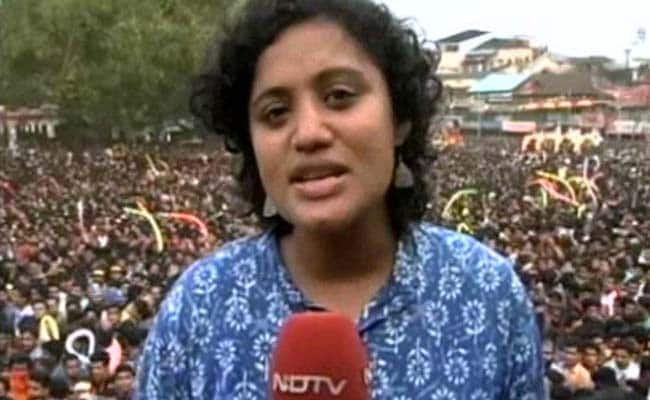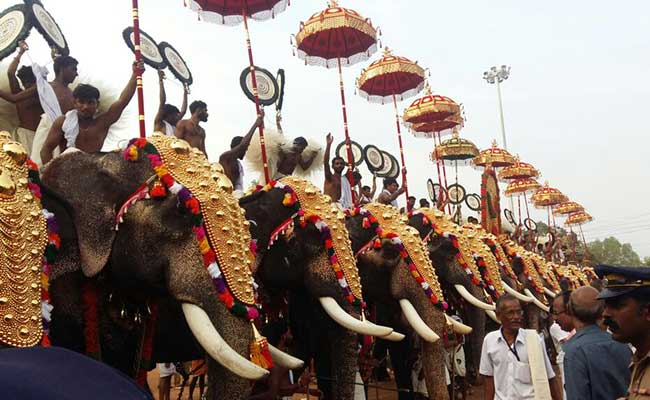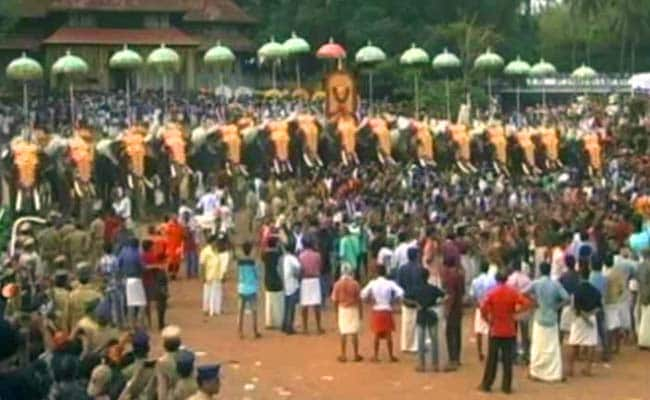
It was my first time attending the Thrissur Pooram festival in Kerala, and despite the impressive grandeur, I leave Thrissur disappointed.
As I entered the temple premises on Sunday morning (the climax of the seven-day annual festival), I saw five majestic elephants, decorated with golden headgear, being taken to the temple. Around them were lively beats being churned out by traditional drums called "chenda". Lakhs of people were enjoying the revelry, including me. It was strange, this atmosphere, because before this, I had been reporting on the tragedy of the charred bodies and meeting distraught families in Kollam where a temple fire killed more than 100. The two districts - Kollam and Thrissur, one seeped in death and the other vibrant with celebrations - are a little over 200 kms apart.
I was reporting all day on air with the elephants as my backdrop.

But by 4 pm, women were gradually disappearing from the massive crowd, estimated at nearly 2 lakhs by local officials. And as the frenzy kept building up (the day was to end with a fireworks display), the large ground south of the Vadakkunnathan temple was full of men. Except in the VIP space and a corner at the other end of the ground, it was a sea of men - some unruly and drunk, many shouting anti-media slogans.
I was stunned. Kerala's largest temple festival, and the most awaited ritual of "Kuddamattom" - competition of traditional umbrellas - had hardly any space for women. I know of women in Kerala who would want to come out and sway to the rhythm and be part of this extravaganza. But I also understood why they would avoid this. "How could we share this public space and still be safe? Men think it's their domain and right to behave the way they are," a friend later told me over the phone. But more saddening was that this was the state of affairs at Kerala's "cultural capital". I had expected better.
 The much awaited procession of 28 elephants, split into two teams, was regal when it began at around 5 pm. Their parade includes a contest of showing off the most varied, creative, beautiful umbrellas. But amidst all this, I could hear menacing slogans of "Go back, media" several times. Loud and clear. There were also specific chants made against a few regional channels. The men making these threats were very upset with the media for questioning the scale of the Thrissur Pooram festival after the Kollam temple fire tragedy. Whether fireworks - which brought an unforgiving blaze to the Kollam temple - should be scaled down in Thrissur had been a headline. This had not gone down well.
The much awaited procession of 28 elephants, split into two teams, was regal when it began at around 5 pm. Their parade includes a contest of showing off the most varied, creative, beautiful umbrellas. But amidst all this, I could hear menacing slogans of "Go back, media" several times. Loud and clear. There were also specific chants made against a few regional channels. The men making these threats were very upset with the media for questioning the scale of the Thrissur Pooram festival after the Kollam temple fire tragedy. Whether fireworks - which brought an unforgiving blaze to the Kollam temple - should be scaled down in Thrissur had been a headline. This had not gone down well.
"See how we celebrate Thrissur Pooram", "Those who question Thrissur Pooram have no shame" - this is what we were told. And soon, shoes, water bottles and stones came flying at reporters and their teams, including ours. The police was quick to push back the hooligans to make some space around the media so we could pack up and leave. I heard cowards applaud as a full one-litre water bottle hit me.
 Our car was parked at a distance. I asked a policeman to accompany us. "We are from a special team, please ask the local police", I was told. I looked around and approached a group of policemen walking past. "I just got hit by a bottle. Can you just walk us through to the car?" I asked.
Our car was parked at a distance. I asked a policeman to accompany us. "We are from a special team, please ask the local police", I was told. I looked around and approached a group of policemen walking past. "I just got hit by a bottle. Can you just walk us through to the car?" I asked.
"It's ok, madam. No one here will recognise you without the mic since you are from national TV. You can go ahead," I was told.
If it was not for my job, like many women - I wouldn't have had the courage to come and see this visual treat.
(Sneha Mary Koshy is NDTV's Kerala correspondent.)
Disclaimer: The opinions expressed within this article are the personal opinions of the author. The facts and opinions appearing in the article do not reflect the views of NDTV and NDTV does not assume any responsibility or liability for the same.
As I entered the temple premises on Sunday morning (the climax of the seven-day annual festival), I saw five majestic elephants, decorated with golden headgear, being taken to the temple. Around them were lively beats being churned out by traditional drums called "chenda". Lakhs of people were enjoying the revelry, including me. It was strange, this atmosphere, because before this, I had been reporting on the tragedy of the charred bodies and meeting distraught families in Kollam where a temple fire killed more than 100. The two districts - Kollam and Thrissur, one seeped in death and the other vibrant with celebrations - are a little over 200 kms apart.
I was reporting all day on air with the elephants as my backdrop.

But by 4 pm, women were gradually disappearing from the massive crowd, estimated at nearly 2 lakhs by local officials. And as the frenzy kept building up (the day was to end with a fireworks display), the large ground south of the Vadakkunnathan temple was full of men. Except in the VIP space and a corner at the other end of the ground, it was a sea of men - some unruly and drunk, many shouting anti-media slogans.
I was stunned. Kerala's largest temple festival, and the most awaited ritual of "Kuddamattom" - competition of traditional umbrellas - had hardly any space for women. I know of women in Kerala who would want to come out and sway to the rhythm and be part of this extravaganza. But I also understood why they would avoid this. "How could we share this public space and still be safe? Men think it's their domain and right to behave the way they are," a friend later told me over the phone. But more saddening was that this was the state of affairs at Kerala's "cultural capital". I had expected better.

Teams of elephants, led by their mahouts, were seen parading since the morning ceremoniously, in a run up to the grand finale in the evening
"See how we celebrate Thrissur Pooram", "Those who question Thrissur Pooram have no shame" - this is what we were told. And soon, shoes, water bottles and stones came flying at reporters and their teams, including ours. The police was quick to push back the hooligans to make some space around the media so we could pack up and leave. I heard cowards applaud as a full one-litre water bottle hit me.

The parade includes a contest of showing off the most varied, creative, beautiful umbrellas
"It's ok, madam. No one here will recognise you without the mic since you are from national TV. You can go ahead," I was told.
If it was not for my job, like many women - I wouldn't have had the courage to come and see this visual treat.
(Sneha Mary Koshy is NDTV's Kerala correspondent.)
Disclaimer: The opinions expressed within this article are the personal opinions of the author. The facts and opinions appearing in the article do not reflect the views of NDTV and NDTV does not assume any responsibility or liability for the same.
Track Latest News Live on NDTV.com and get news updates from India and around the world

